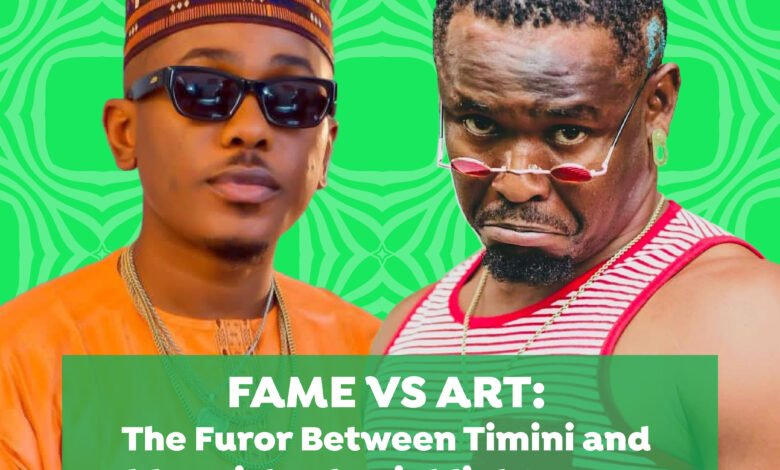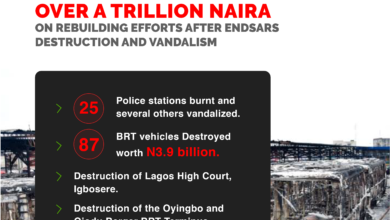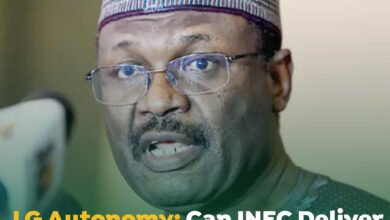Fame vs Art: The Furor Between Timini and Zubby Michaels Highlights Deeper Issues in the Film Industry

The Nigerian creative industry served its audience with a different form of entertainment in the past few days. The story began from an episode of a new series, Ebuka Turn Up Africa, headlined by the popular TV host, Ebuka Obi Uchendu, and aired on Amazon Prime. Among the cast of famous creative personalities who toured Africa were Timini Egbuson and Zubby Michael, two actors of distinct histories, but whose egos clashed and splashed on air, and overflowed the banks of social media with fearsome debates.
Timini rated Zubby Michael a local lad with regional clout, and deemed himself a global star of incomparable status. Zubby thought otherwise. He not only believed he was the bigger actor, but he valued himself to be of extraordinary height and bourgeoning influence, large enough to audaciously declare he could buy Timini. In the context of Nigerian braggadocios social parlance, Zubby’s declaration, reminiscent of Davido-BurnaBoy beef of album swallowing album, implies that he is so big his portfolio and influence will gulp Timini’s and there would be nothing remaining of the latter.
Nigerians, ever the ones to never fail to pounce on good entertainment, queued differently behind the two actors, culminating in an industrious days-long online kerfuffle. Yet this loquacious beef, howbeit friendly as some claimed, failed like most Nigerian creative ruckus, to utilize the opportunity to have an important conversation.
What are the metrics with which we should weigh the worth of an actor? What does it mean when these actors argue amongst themselves about who is bigger? Does it mean who is richer or who has featured in more number of film projects or the one with better artistic talent or the one who puts his skill better to work or who is more famous?
Acting, as the term simply implies, requires the believable assumption of traits and characters and mannerisms for the portrayal of events, epochs, periods, eras, and facts. If actors must be compared, then it must be on the scale of who betters the other on the exact plying of their trade. It is the acting, not the clout or fame, that should form the basis of judgment for actors. To put it in context, sportsmen like Kylian Mbappe and Erling Haaland should be rated only within relevant metrics of their profession, and not the unnecessary accompaniments like the cars and social media followers they have got. Presidents like Barrack Obama and Prime Ministers like Theresa May held for their policies and not for the prodigiousness of their retirement homes.
But even when we stray from the subject of Timini and Zubby’s acting, both of whom are hardly excellent actors, the conversation also fails to discuss the vital elements of distribution, mediums, and their varying consequences on reach, clout, and influence.
Zubby Michael began his career from the east of Nigeria before venturing into Lagos and the southwest. That background, often captured in the perhaps derisive coinage of Asabawood, a subset of the larger Nollywood deemed inferior by elitists and creative purists, but whose work rate, output, and vast distribution leverage diverse network and mediums and channels like Youtube and African Magic, has ironically propelled the reach and fame of Zubby, far beyond the imagination of Timini and followers. The show even proved that: after the basketball game in Kigali, Rwanda, fans marched towards Zubby like soldier ants, demanding pictures in terrific fandom. Timini had his words to eat and he found the truth in Zubby’s evaluation of his fame to only end at the boundaries of Sagamu.
But there is fame and there is audience quality. Timini began in Lagos and over the years has seen more works in the cinema. Zubby, too, as he argued, has penetrated the Lagos entertainment cabal and is also in the cinema—although his frequency pales to Timini’s. YouTube is in everyone’s hands and African Magic in every average Nigerian home, but cinema is, in Nigeria, the thing of the elite or the vastly vanishing middle class. Tickets have gone from an average of N3000 to N11,000. This is in a country where the minimum wage is N30,000 and the unemployment rate is close to 40%. So when we talk about these actors’ wealth, where does the origin of Zubby’s lie, nor the fate of Timini, the darling of the cinema-going purists, and how rewarding is Nigeria’s cinema?
Timini has about 1.3 million followers on Instagram. Zubby Michael has over 6 million. Clearly, there can be swallow—triple swallow, even—but you understand that it has nothing much to do with their artistic skillset but more about their distinct histories and distribution roots. How many cinemas are there in the north, and how many people visit the few in the southeast? What is the statistical trend of the ones in Lagos, Abeokuta, and Ibadan especially in a shrinking economy?
The creative industry has been one of Nigeria’s greatest exports and now, under President Bola Tinubu, specific attention is being paid to the sector. It is a good development that must assume urgent implementations if we must properly harness and secure the lucres of this industry. And to do so, nuanced conversations like this must be had for the improvement of important elements, and to the benefit of all involved stakeholders.





